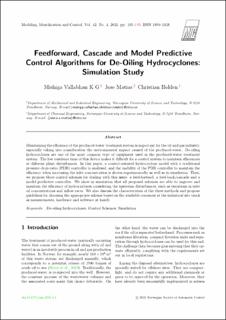| dc.contributor.author | Kulangarakalam Gayathrivallabh, Mishiga Vallabhan | |
| dc.contributor.author | Assumpcao Matias, Jose Otavio | |
| dc.contributor.author | Holden, Christian | |
| dc.date.accessioned | 2023-02-22T09:37:54Z | |
| dc.date.available | 2023-02-22T09:37:54Z | |
| dc.date.created | 2022-01-21T09:09:55Z | |
| dc.date.issued | 2021 | |
| dc.identifier.citation | Modeling, Identification and Control. 2021, 42 (4), 185-195. | en_US |
| dc.identifier.issn | 0332-7353 | |
| dc.identifier.uri | https://hdl.handle.net/11250/3053079 | |
| dc.description.abstract | Abstract: Maintaining the efficiency of the produced-water treatment system is important for the oil and gas industry, especially taking into consideration the environmental impact caused of the produced-water. De-oiling hydrocyclones are one of the most common type of equipment used in the produced-water treatment system. The low residence time of this device makes it difficult for a control system to maintain efficiencies at different plant disturbances. In this paper, a control-oriented hydrocyclone model with a traditional pressure drop ratio (PDR) controller is analysed, and the inability of the PDR controller to maintain the efficiency when increasing the inlet concentration is shown experimentally as well as in simulation. Then, we propose three control schemes for dealing with this issue: a feed-forward, a feed-back/cascade and a model predictive controller. We show in simulation that all proposed schemes are able to improve and maintain the efficiency of hydrocyclones considering the upstream disturbances, such as variations in inlet oil concentrations and inflow rates. We also discuss the characteristics of the three methods and propose guidelines for choosing the appropriate scheme based on the available resources at the industrial site (such as measurements, hardware and software at hand). | en_US |
| dc.language.iso | eng | en_US |
| dc.publisher | Norsk forening for automatisering (Norwegian Society of Automatic Control) | en_US |
| dc.relation.uri | https://www.mic-journal.no/ABS/MIC-2021-4-4.asp/ | |
| dc.rights | Navngivelse 4.0 Internasjonal | * |
| dc.rights.uri | http://creativecommons.org/licenses/by/4.0/deed.no | * |
| dc.title | Feedforward, Cascade and Model Predictive Control Algorithms for De-Oiling Hydrocyclones: Simulation Study | en_US |
| dc.title.alternative | Feedforward, Cascade and Model Predictive Control Algorithms for De-Oiling Hydrocyclones: Simulation Study | en_US |
| dc.type | Peer reviewed | en_US |
| dc.type | Journal article | en_US |
| dc.description.version | publishedVersion | en_US |
| dc.source.pagenumber | 185-195 | en_US |
| dc.source.volume | 42 | en_US |
| dc.source.journal | Modeling, Identification and Control | en_US |
| dc.source.issue | 4 | en_US |
| dc.identifier.doi | 10.4173/MIC.2021.4.4 | |
| dc.identifier.cristin | 1987079 | |
| dc.relation.project | Norges forskningsråd: 237893 | en_US |
| cristin.ispublished | true | |
| cristin.fulltext | original | |
| cristin.qualitycode | 1 | |

